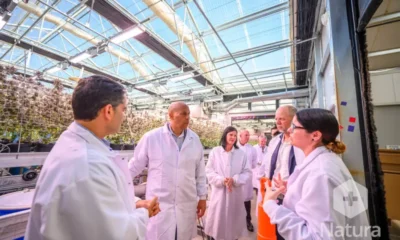Connect with us
Published
1 year agoon

Researchers at the University of Iowa (UI) are conducting a new pilot study that will reevaluate the use of psychedelics and ketamine as potential treatments for alcohol use disorder.
The study is the first of its kind for the university and will be conducted as a head-to-head comparison of both compounds. The participants of the study are men with alcohol use disorder, with half of the study participants receiving psilocybin and half of the participants receiving ketamine. Neither the researchers nor the subjects of the study will know which substance the participants received.
Lead therapist for the study and licensed psychologist Candida Maurer said there will be a two-hour meeting with a licensed psychologist before administration of the dose. Maurer said their sessions will involve a mixture of body therapy, cognitive behavior therapy, meditation, relaxation, inner-child therapy and mind-body therapy with the subjects. Subjects will also receive MRI scans before and after the administration of doses and a final MRI scan three months after administration.
UI Department of Psychiatry Chair Peggy Nopoulos, who has been studying psychedelic drugs for 20 years said research into the drugs has steadily increased again after all advances made in research during the 1950s and 60s vanished with the passing of the Controlled Substances Act in 1970, which made psychedelics illegal.
“There were concerns by the government that they were causing too much unrest societally,” Nopoulos said. “I said it was very political because, scientifically, they were making pretty great strides, so politically shutting them down made all the science go away for several decades.”
Previous research has shown psilocybin mushrooms have been effective in treating alcohol use disorder. A study published in JAMA Psychiatry last year found just two doses of psilocybin paired with psychotherapy significantly reduced alcohol consumption for up to eight months after first treatments for individuals with alcohol use disorder. The trial involved 93 men and women, who were each averaging seven alcoholic drinks at a time, receiving either two psilocybin doses or a placebo in addition to 12 psychedelic sessions. Over 80 percent of those who received the psilocybin doses reduced their drinking after eight months, compared with 50 percent of those who were dosed with the placebo.
“These are exciting results,” Dr. Bogenschutz said. “Alcohol use disorder is a serious public health problem, and the effects of currently available treatments and medications tend to be small.”
Other research has also been done on the potential use of psychedelics to treat various mental health disorders. Nonprofit organization Heroic Hearts Project, which educates and supports veterans interested in psychdelic treatment options, partnered with Imperial College London (ICL)’s Centre for Psychedelic Research to study the use and efficacy of psychedelic treatment options ofr veterans suffering from traumatic brain injuries.
Other universities such as the University of California, Davis are helping advance research into the therapeutic uses and benefits of psychedelics by creating the Institute for Psychedelics and Neurotherapeutics, which will bring scientists from a variety of industries together with the pharmaceutical industry to advance basic knowledge about psychedelics and ensure that key discoveries of safe and effective treatments will be translated into new medicines for patients. The institute is funded by philanthropists and the university itself, making it different from other institutes conducting research on the same field of study.
“Psychedelics have a unique ability to produce long-lasting changes in the brain that are relevant to treating numerous conditions,” said David E. Olson, founding director of the institute and associate professor in the Department of Chemistry and the Department of Biochemistry and Molecular Medicine at UC Davis. “If we can harness those beneficial properties while engineering molecules that are safer and more scalable, we can help a lot of people.”


Thailand Prime Minister Aims To Re-List Cannabis as Narcotic By End of 2024


Hemp-Based Food Market to Soar to Over $8B by 2029, Report Forecasts


Vermont House Representatives Pass Psychedelic-Assisted Therapy Working Group Bill


Senator Cory Booker Visits Sacramento Cannabis Giant Amid Decriminalization Push


Illinois Hemp Operators Call For Regulation Instead of Prohibition


Signatures for South Dakota Adult-Use Cannabis Initiative Submitted
